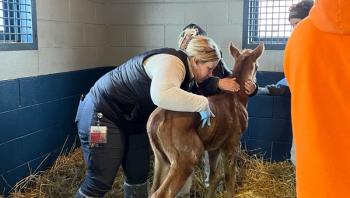
AVMA Takes on Stem Cell Research, Exotics Trade
Schaumburg, Ill. — American Veterinary Medical Association (AVMA) leaders approved several positions, recognized diversity and upped convention registration fees starting in 2007 to earn an estimated $86,000 extra.
SCHAUMBURG, ILL. — American Veterinary Medical Association (AVMA) leaders approved several positions, recognized diversity and upped convention registration fees starting in 2007 to earn an estimated $86,000 extra.
The actions passed during the Executive Board's November meeting. In addition to prioritizing the profession's entry into public health with Research for Healthy Animals 2010 (see related story), AVMA took a stance on biotechnology-derived veterinary medical products. The statement acknowledges AVMA's commitment to pure, safe, potent and efficacious medicines for animals. The group supports biotechnology when it benefits the production of such products that are approved by federal regulatory agencies.
"Biotechnology methods may allow the production of medicinal products that could not be developed by older technology," the position says. "The AVMA urges that any additional regulation of products developed through biotechnology be risk-based and science-based."
Stem cell research
Continuing on the topic of science, Executive Board members addressed stem cell research. Brought by the AVMA Council on Research, the statement maintains that AVMA "supports and encourages the ethical study and use of animal cells for the benefit of animal and human health." It continues with "AVMA is in full accordance with the Guidelines for Human Embryonic Stem Cell Research" and recognizes that the protection of animal welfare "must always apply during the course of mixing animal and human stem cells." The statement also notes that such research should be conducted in accordance with ethical standards of veterinary medicine.
Considering the advances in stem cell science, it was time AVMA adopted a stance, says Dr. Kent Lloyd, task force member and researcher at the University of California-Davis School of Veterinary Medicine.
"It's been several years since Dolly the sheep was first cloned and the realization that stem cells could be utilized for therapy or animal cloning made us take note that AVMA had not yet taken a position," Lloyd says. "The committee felt enough had gone on in the last five years in terms of stem cells and how they're manipulated."
Exotic animal trade
In accordance with its new policy on the international and national trade of exotic animals, AVMA supports the creation of a working group to formulate an effective policy and approach to address public and animal health threats associated with the practice.
AVMA recommends the Centers for Disease Control and Prevention lead the initiative to coordinate federal agencies and other stakeholders to address the issue.
"Recent occurrences of zoonotic diseases introduced into the United States and the risks posed by other zoonoses demonstrate that there is a need to coordinate and focus national efforts to proactively evaluate the potential risks associated with the international and national trade of animals," the statement says.
NAIS, surveillance
AVMA replaces its policy on the U.S. Animal Identification Plan with a statement on the National Animal Identification System (NAIS). The new position supports the creation of a database accessible by animal health officials but is not so costly it detracts from effective implementation. AVMA also wants it to be workable for all producers. Implementation should engage all stakeholders, and the database should include privacy protection, the association says.
Surveillance and control needs are outlined in AVMA's revised stance on the control of foreign disease vectors and invasive species. Appropriate measures to protect the United States include inspection, isolation, quarantine, decontamination and pesticide application. AVMA deems such surveillance and control necessary when dealing with international commerce and travel.
Honoring diversity
Apart from the position statements, Executive Board members voted to designate Martin Luther King Jr. Day an additional paid holiday for AVMA employees. The move shows the association's commitment to diversity, AVMA President Dr. Henry Childers says.
"This will encourage AVMA employees to participate in activities devoted to celebrating the life of Dr. King, honor his memory, and spend time with their children and other family members and friends whose employers or school districts observe this holiday," he says.
Other business
Executive Board members approved sending a report by the Task Force on Veterinary Infrastructure in Iraq and Afghanistan to the group's joint committee with the Association of American Veterinary Medical Colleges. The charge: to explore the concept of developing an overarching mechanism for the U.S. veterinary profession to address the increasingly global nature of veterinary medicine, particularly in the areas of educational, informational and operational needs.
The group also approved developing legislation designed to address the nation's unwanted horse population. The move follows AVMA's lobbying for the defeat of the American Horse Slaughter Prevention Act and a related amendment to the 2006 Agriculture Appropriations Bill, which passed. The board agreed to pay $1,000 in dues for participation in the Unwanted Horse Summit.
Additional funding was approved for the 2006 Biennial Economic Survey to develop increasingly detailed economic statistics on professional incomes of board-certified veterinary specialists.
Newsletter
From exam room tips to practice management insights, get trusted veterinary news delivered straight to your inbox—subscribe to dvm360.




